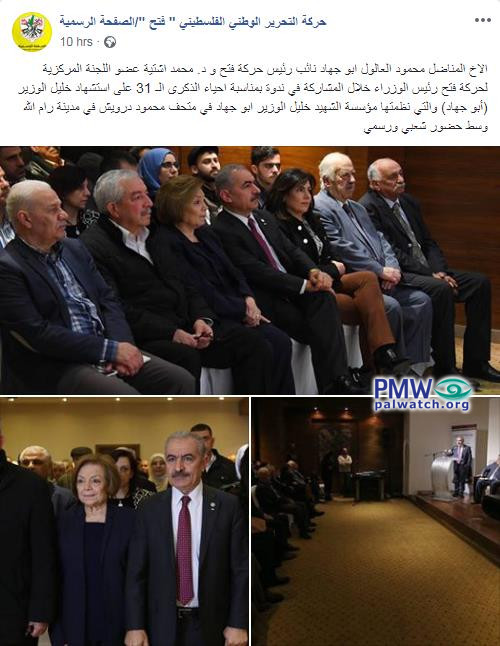PA Prime Minister and Deputy Fatah Chairman attend conference for the anniversary of arch terrorist Abu Jihad’s death, who was responsible for deaths of 125
 Posted text: "Deputy Fatah Chairman [and Fatah Central Committee member] fighter Mahmoud Al-Aloul 'Abu Jihad' and Fatah Central Committee member and [PA] Prime Minister Muhammad Shtayyeh as they participated in a conference for the 31st anniversary of the death as a Martyr of Khalil Al-Wazir (Abu Jihad), which was organized by the Khalil Al-Wazir 'Abu Jihad' Foundation at the Mahmoud Darwish Museum in Ramallah, with popular and official attendance."
Posted text: "Deputy Fatah Chairman [and Fatah Central Committee member] fighter Mahmoud Al-Aloul 'Abu Jihad' and Fatah Central Committee member and [PA] Prime Minister Muhammad Shtayyeh as they participated in a conference for the 31st anniversary of the death as a Martyr of Khalil Al-Wazir (Abu Jihad), which was organized by the Khalil Al-Wazir 'Abu Jihad' Foundation at the Mahmoud Darwish Museum in Ramallah, with popular and official attendance."
Abu Jihad (Khalil Al-Wazir) - was a founder of Fatah and deputy to Yasser Arafat. He headed the PLO terror organization's military wing and also planned many deadly Fatah terror attacks in the 1960’s - 1980’s. These attacks, in which a total of 125 Israelis were murdered, included the most lethal in Israeli history - the hijacking of a bus and murder of 37 civilians, 12 of them children.
Mahmoud Darwish is considered the Palestinian national poet. He published over 30 volumes of poetry and 8 books of prose and has won numerous awards. He joined the Israeli Communist Party in 1961 and the terrorist organization PLO in 1973, becoming a member of the PLO Executive Committee in 1987. He left the PLO in 1993 because it signed the Oslo Accords with Israel. Many in Israel see his poetry as inciting hate and violence. One poem he wrote in 1988 at the height of the Palestinian wave of violence and terror against Israel in which approximately 200 Israelis were murdered (the first Intifada, 1987-1993) calls to Israelis: “Take your portion of our blood - and be gone… Live wherever you like, but do not live among us… Die wherever you like, but do not die among us… Leave our country, our land, our sea, our wheat, our salt, our wounds, everything, and leave the memories of memory.” In 1964, he wrote a poem entitled "ID Card" in which he said: "I do not hate people, And I do not steal from anyone, But if I starve I will eat my oppressors' flesh; Beware, beware of my starving, And my rage." He also wrote “Silence for the Sake of Gaza” in 1973, which many see as glorifying terror: “She wraps explosives around her waist and blows herself up. It is not a death, and not a suicide. It is Gaza's way of declaring she is worthy of life.” His defenders have claimed that Israel misinterprets his poetry and that he sought reconciliation with Israel. One wrote in 2017: “Darwish arranged meetings between Palestinian and Israeli intellectuals, and published essays on their discussions. He was optimistic that, through mutual understanding, the two sides could eventually reconcile.” [https://www.bcalnoor.org/]
» View analysis citing this item